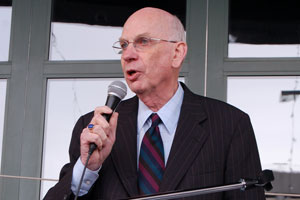Last Saturday, three-term Sen. Bob Bennett (R-Utah) lost his party’s nomination for the Senate seat he currently occupies—coming in third at the state GOP convention. I told you not to cry for him—party activists going after members of Congress they aren’t happy with is totally rational. (On Tuesday, Rep. Alan Mollohan (D-W.Va.) became the second incumbent to lose his party’s nomination this cycle.)
Now Newsweek‘s McKay Coppins is saying that if Utah ends up electing a Democrat, you can “thank the Tea Party.” People should be careful about giving all the credit for Bennett’s defeat to grassroots Tea Partiers. It’s true that in the end, conservative activists and Tea Partiers voted Bennett out at the convention. But it’s unlikely that things would have even gotten to that point without the intervention of two big outside groups—the Club for Growth and FreedomWorks. David Frum explained their role last month:
Bennett is caught in a range war between two such conservative allies: the Club for Growth and FreedomWorks. Founded more than a decade ago, the Club for Growth has raised and spent millions of dollars to support tax-cutting Republican opponents of incumbents. In the past few cycles, this strategy has led to a sequence of disasters. Club-backed challenges to moderate Republican incumbents like Michigan Congressman Joe Schwarz in 2006 and Maryland’s Wayne Gilchrest in 2008 tipped both seats to Democrats. The threat of a Club-backed primary pushed Arlen Specter to change parties in 2009, (briefly) handing Barack Obama his 60th Senate vote.
This unsatisfying record opened space for a competitor: FreedomWorks, an activist organization run by former House majority leader Dick Armey and generously funded by the billionaire Koch family of Wichita, Kans. FreedomWorks thrust itself to the fore of the Tea Party last year, providing the sometimes stumbling movement with professional skills. In the process, FreedomWorks gained some clout and challenged the Club for Growth to put some numbers on the board.
The Bennett race provided the perfect opportunity. Utah is supersafe Republican territory; the party faces no danger of losing the seat. And so, without endorsing any particular contender, the Club began running television ads attacking Bennett last fall. It slammed Bennett for his 2008 vote in favor of the Troubled Asset Relief Program and his co-sponsorship of the Healthy Americans Act, which would require Americans to buy insurance. In February, FreedomWorks jumped into the campaign against Bennett too, in part to forestall the rival Club from hogging the spotlight and snaring all the dollars.
None of this is to say that grassroots opposition didn’t matter. But big spending on television ads makes a difference in political campaigns. The people writing Bennett’s political obituaries should acknowledge the role that big outside groups played in his defeat.















